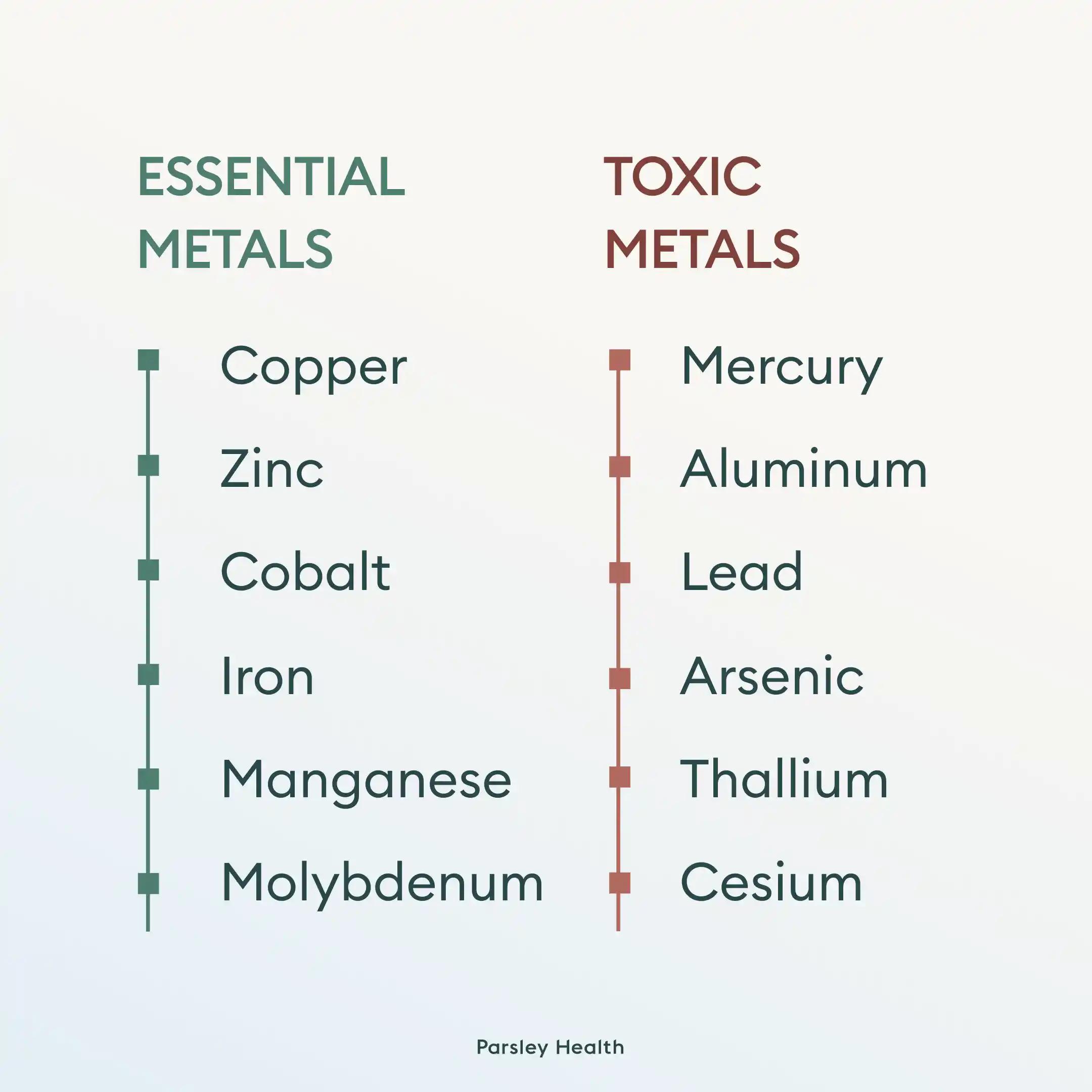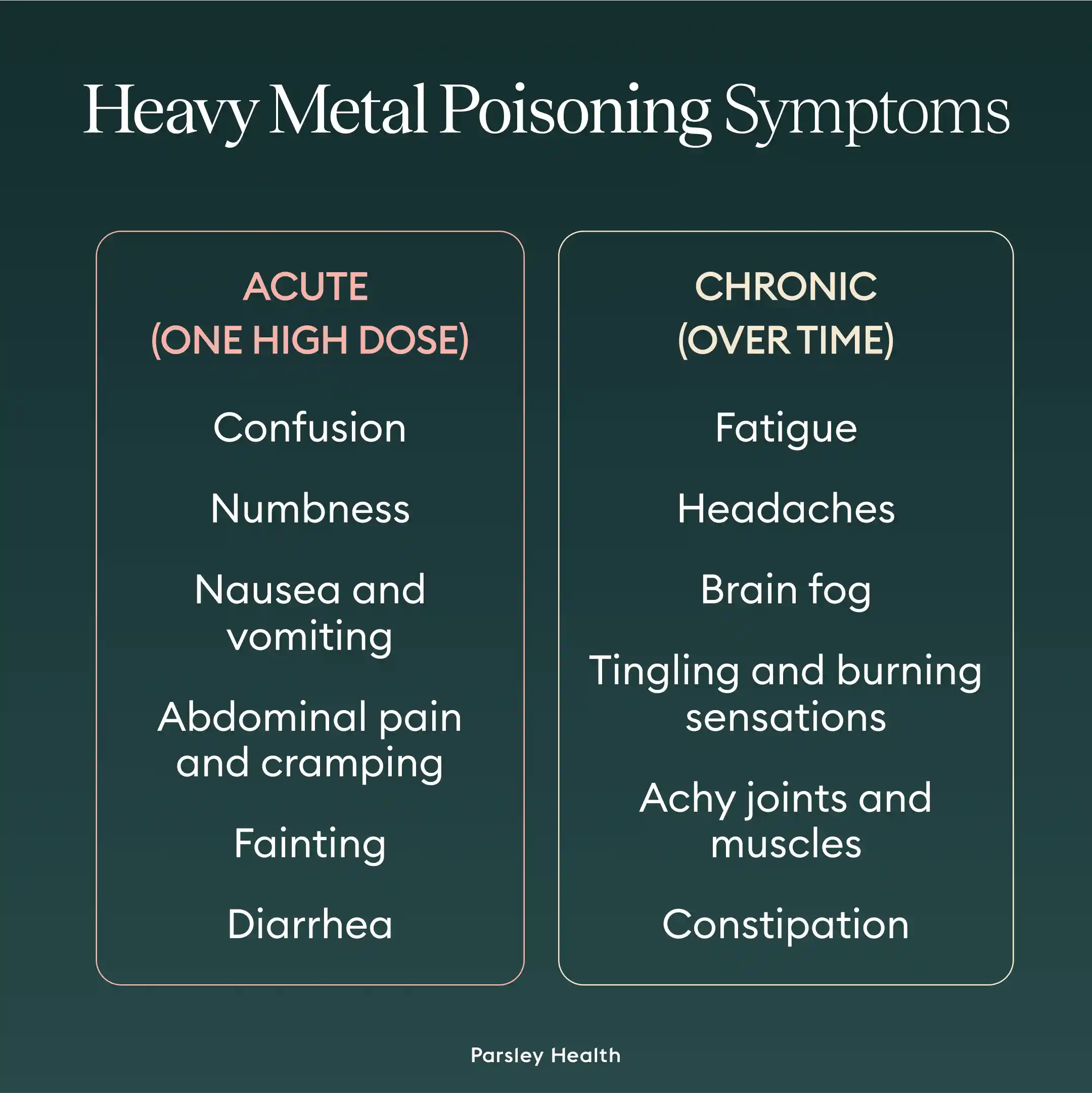This article contains additional reporting by Jennifer Chesak.
Heavy metals are in our food, beauty products and even teeth fillings, but many of us know little about them. You may be wondering if you have heavy metal toxicity, if you need to detox, and what heavy metal detox side effects might be.
Extremely high levels of exposure to heavy metals can be dangerous. But you likely won’t experience heavy metal poisoning, since it's considered rare in the United States.
We’ve laid out the top four things you should know about heavy metals, where they’re coming from, and how you can undergo a heavy metal detox if needed.
What are heavy metals?
These are the top four things you need to know about heavy metals.
Metals are natural
Metals are naturally present in soil because they are part of the earth’s crust. A heavy metal is defined as an element with a specific gravity that is at least five times that of water.
Metals are essential
About 20 metals are essential to the body. They are responsible for important bodily processes. These include six transitional elements that are in the "d-block" of the periodic table.
Copper
Zinc
Cobalt
Iron
Manganese
Molybdenum
Some metals are dangerous
High levels of mercury, lead, arsenic, thallium, and other heavy metals can cause symptoms as varied as nerve damage, pain, nausea, vomiting, headaches, fatigue, thyroid dysfunction, kidney disease and cancer.

Each metal can cause unique symptoms if accumulated to toxic levels.
Heavy metal poisoning or toxicity is rare
Usually significant exposure is required for severe symptoms to show up. Heavy metal poisoning is relatively rare in the United States.
However, low-grade chronic exposure from things like poor diet, toxic environments, and more can still lead to a buildup of low to moderate levels of metals in the body.
This heavy metal accumulation, while not classified as an actual toxicity, can cause immune dysfunction, hormone imbalance, fatigue, brain fog, and even high blood pressure in the case of lead.
Many doctors don’t normally test for heavy metals in the blood because they may not recognize the hallmark symptoms. Plus, the symptoms can sometimes be confused for other conditions.
At Parsley Health, we regularly test for heavy metals to make sure you’re in the clear. If we find that you have high levels of heavy metals, we’ll walk you through the steps of a heavy metal detox and continue testing your levels until they’re back to a lower range.
The most common sources of heavy metal exposure
Sources of heavy metal exposure include the following.
Arsenic
Rice and seafood can contain arsenic. Both the inorganic and organic forms of arsenic are naturally occurring, and the inorganic form is much more toxic, but also less prevalent.
Mercury
You could be exposed to mercury if you work in an industry such as mining, sanitation, or certain types of manufacturing, according to the Occupational Safety and Health Administration (OSHA).
Mercury is also in amalgam dental fillings. These can release a small amount of mercury vapor during chewing or when the filling is being placed or removed. These vapors can accumulate and then be excreted via the kidneys.
However, the U.S. Food and Drug Administration (FDA) and the Environmental Protection Agency (EPA) consider these fillings to be safe.
Research is ongoing regarding amalgam dental fillings, so guidance may change in the future. Researchers acknowledge an association with a higher amount of amalgam fillings and increases in daily amounts of mercury in urine.
Fish and shellfish also contain trace amounts of methylmercury. Methylmercury, via the gut, can accumulate in bodily tissues. The FDA and EPA have guidelines for eating fish and offer a list of fish with the highest amounts of mercury. Pregnant or nursing people and children under age 12 should avoid the following.
King mackerel
Marlin
Orange roughy
Shark
Swordfish
Tilefish
Tuna (bigeye)
Aluminum
Aluminum is commonly found in antiperspirants, medications, and personal care products. Previous small-scale research showed potential links between breast cancer and Alzheimer’s disease and aluminum exposure from antiperspirants.
However, recent research and reviews of clinical data suggest that no clear evidence supports this link. Specifically, researchers mention that while elevated aluminum has been found in the brains of patients with Alzheimer’s, “it remains unclear whether this is a cause or an effect of the disease.”
Though aluminum exposure may not definitively be linked to these diseases, it may still contribute to a buildup of toxins in the body. However, acute aluminum toxicity is rare.
Lead
Lead exposure has declined dramatically in the United States over the past 50 years. Lead can still come from multiple sources, however, including the following.
Paint in old houses (those built before 1978)
Fuel emissions (from leaded gasoline only)
Drinking water from lead pipes, faucets, and fixtures
Lead is also present in small amounts in food. However, research suggests that exposure from diet is unlikely to increase blood lead levels.
Thallium and Cesium
Some greens contain thallium and cesium. However, when consumed in moderation, these veggies are a healthy choice.
Concern arises for thallium contamination when foods are grown near smelters, coal combustion power plants, and cement plants.
At Parsley Health, when we see high thallium levels in members, we may suggest decreasing kale consumption.
What are heavy metal poisoning symptoms?
Heavy metal poisoning is relatively uncommon. However some people may still experience effects of less serious heavy metal accumulation in the body. Here are the potential signs you may need a heavy metal detox.

Acute poisoning (high dose at one time):
Confusion
Numbness
Nausea and vomiting
Abdominal pain and cramping
Fainting
Diarrhea
Chronic exposure (low dose over time):
Fatigue
Headaches
Brain fog
Tingling and burning sensations
Achy joints and muscles
Constipation
How to test for heavy metal poisoning
If you think you may have high levels of heavy metals in your body, get tested to have a clearer picture of what’s going on.
At Parsley Health, we offer heavy metal testing by checking for levels in blood, urine, and hair samples, via home testing kits. (Read more about the five essential blood tests you need every year.)
You may also receive a prescription called DMSA , which provokes the release of heavy metals.
What is a heavy metal detox?
In severe cases, people may need chelation therapy to clear their body of heavy metals. Chelation therapy uses chelating agents, such as dimercaprol, that bind to toxic metal ions and help you excrete them from your body. Chelating agents are generally administered through an IV.
Common side effects of heavy metal detox
The following are side effects of chelation therapy.
Headache
Nausea
Vomiting
Fever
Burning at the IV injection site
Alternatives to heavy metal detox
The need for chelation therapy is rare, since heavy metal poisoning is uncommon in the general population.
If you do test for higher-than-normal levels of heavy metals and are experiencing symptoms, your doctor or provider can advise you on the best course of action for reducing your exposure.
Freeing your body of any toxins is an extremely important part of optimizing your overall health. However, if you’re pregnant, elderly, or severely ill, we do not recommend a heavy metal detox. This is because the mobilization of the toxins could cause negative side effects for the developing fetus or for those with compromised immune systems.
Your doctor or provider may recommend a combination of the following, depending on your health status.
Boost fiber and detox-friendly foods
Focus on a high-fiber diet with a goal of at least 30 to 50 grams per day from plant-based sources.
Pair your higher fiber intake with adequate hydration to encourage regular elimination.
Heavy metal detox diet
Include the following heavy metal detox-friendly foods.
Cruciferous veggies
Bitter greens
Parsley
Cilantro
Mint
Basil
Nettles
Spirulina
Chlorella
Herbal teas: dandelion, milk thistle, turmeric, ginger, and lemon
Skip these inflammatory ingredients and foods.
Alcohol
Caffeine
Conventionally raised meat (opt for regeneratively farmed)
Gluten
Dairy
Soy
You can also ask your doctor about adding targeted supplements, like antioxidants and phytonutrients, that further support your body’s methylation. Methylation is a biochemical process essential to heavy metal detoxification and repair.
Incorporate regular detox practices
Ensure regular sweating through heart-rate raising physical activity. Saunas can also be a great tool if you're cleared by your doctor to use one.
For complementary lifestyle therapies, you can also consider lymphatic massage and dry brushing for additional detox benefits.
Also include healthful ways to manage stress and anxiety, such as vagus nerve stimulation. Consider building a consistent meditation practice and making time for self-care.
FAQ
What are the symptoms of heavy metal detoxification?
Detoxing from heavy metal poisoning involves chelation therapy. Chelation therapy can cause headaches, nausea, vomiting, fever, and burning at the IV injection site.
Is it safe to do a heavy metal detox?
A heavy metal detox is only necessary in the rare event of heavy metal poisoning. Chelation therapy, given intravenously, is done under the supervision of a doctor and is safe. However, certain individuals may not be candidates, depending on their health status.
How long do heavy metals stay in the body?
How long heavy metals stay in the body will depend on which metals you've been exposed to, the extent of the exposure, and your underlying health conditions.
What vitamin removes heavy metals?
Vitamins E and C have natural chelating effects on the body, meaning they help eliminate heavy metals. Do not up your intake of these vitamins without consulting your doctor. Vitamin E in high amounts can be harmful and cause major bleeding issues.
Is metal detox good?
You will only need a heavy metal detox if your test results show toxic levels. In this case, chelation therapy may be necessary. However, whether chelation therapy is safe for you will depend on your overall health status.
How do you tell if you are detoxing heavy metals?
After chelation therapy or a customized heavy metal detox diet, your doctor or provider can test you again to check your levels.
Takeaway
Heavy metal poisoning is rare. If you do have heavy metal poisoning, your doctor may suggest chelation therapy.
If you test for levels that don't equate to toxicity but they are still higher than what's considered normal, your doctor or provider may recommend alternative therapies. Such therapies may include a diet that reduces your exposure and keeps your body in balance.


